Martin Scorsese has established himself as one of the most renowned film directors of all time. Throughout his lengthy career he has continued to come out with hit after hit: Goodfellas, Hugo, Taxi Driver, The Departed. There is no doubt that he knows the industry well, but this doesn’t mean he is automatically right when it comes to all things cinema. He recently sparked controversy when he dismissed Marvel films in an interview, claiming that they are “not cinema” and comparing them to the cheap thrills of theme parks. Here is what he had to say on the matter:
“I don’t see them. I tried, you know? But that’s not cinema. Honestly, the closest I can think of them, as well made as they are, with actors doing the best they can under the circumstances, is theme parks. It isn’t the cinema of human beings trying to convey emotional, psychological experiences to another human being.”
Martin Scorsese
The resulting debate over the cinematic quality of the films has split many people in their opinions. Before delving into that, I want to consider the definition of cinema he proposes. He describes the process of “human beings trying to convey emotional, psychological experiences to another human being”. Whilst this is an important component in creating deep and compelling film, it is not necessarily the defining factor in what makes a film ‘cinematically good’. When it comes to the Marvel Cinematic Universe, the films released are action-packed and make use of the top special effects technology has to offer. A common opinion today, that Scorsese might agree with, is that this is simply regurgitated content used to give into the corporate money-making machine that is Hollywood. However, whilst Marvel have mastered this aspect of the industry, with Avengers: Endgame (2019) making history as the highest grossest film of all time, their films have so much more to offer.

Despite consisting of multiple worlds, plot lines and even species, each individual story in the franchise is explored in depth. We are presented with complex characters, some of whom have been developed in the universe for over a decade, so it isn’t surprising that fans have found emotional resonance within these films. Using different directors for the many movies featured gives each one its own originality, and therefore avoids the pitfall of seeming repetitive or basic. Rather impressively, Stan Lee’s intricate world of comic books has been transformed into the biggest franchise in the world, innovating the film industry as we know it.
Perhaps what Scorsese is experiencing, then, is a struggle to adjust to the changing nature of the industry. Whilst he doesn’t deny that the films are “well made”, he criticises the lack of “emotional, psychological experiences” that, in his opinion, make ‘good cinema’. When we consider his background, as a student of film himself and having grown up on the likes of Alfred Hitchcock and Orson Welles, it is understandable for him to view entertainment such as Marvel as lacking in true cinematic quality.
An interesting perspective to consider here is that of Marvel writer Kareem Abdul-Jabbar. In response to Scorsese’s comments, he believes that the filmmaker is “objectively wrong” but “culturally right”, and makes a distinction between “High Art” and regular everyday art. “With Marvel melodrama we feel better. With High Art, we are wiser.’ He distinguishes between the entertainment value Marvel holds and the nuanced, stylistic form of “High Art” cinema. What we learn from some of the most revered films of all time, such as Citizen Kane and The Godfather, one simply cannot learn from the MCU. This does not mean the films can be dismissed as having no cinematic quality, but that they are simply inherently different genres, developed with hugely different intentions in mind, and therefore will of course differ in what they bring to the industry. After all, if all films were compared to the likes of the classics mentioned, they would rarely be classed as good cinema.
Ultimately, Scorsese has “tried and failed” to watch superhero films. Having experienced the development of cinema in its early stages, and contributing to many of the established techniques of the film industry today, the director appears to struggle with this new form of cinema superhero films have established. He dismisses the MCU without taking the time to properly watch and analyse the films, viewing them as somewhat basic compared to his interpretation of true cinema. Once you take a closer look, though, whilst the films may lack in the cinematic elements of “High Art”, as Abdul-Jabbar states, they have skillfully contributed to the creation of a complex movie universe which has gained international appeal, establishing an overwhelming emotional rapport with dedicated fans from all over the world.
Photo Credit: JoBlo.

